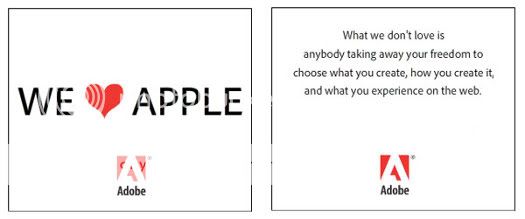This morning Apple posted some thoughts about Flash on their web site.
The primary issue at hand is that Apple is choosing to block Adobe's
widely used runtimes as well as a variety of technologies from other
providers.
Clearly, a lot of people are passionate about both Apple and Adobe and
our technologies. We feel confident that were Apple and Adobe to work
together as we are with a number of other partners, we could provide a
terrific experience with Flash on the iPhone, iPad and iPod touch.
However, as we posted last week, given the legal terms Apple has
imposed on developers, we have already decided to shift our focus away
from Apple devices for both Flash Player and AIR. We are working to
bring Flash Player and AIR to all the other major participants in the
mobile ecosystem, including Google, RIM, Palm (soon to be HP),
Microsoft, Nokia and others.
We look forward to delivering Flash Player 10.1 for Android
smartphones as a public preview at Google I/O in May, and then a
general release in June. From that point on, an ever increasing number
and variety of powerful, Flash-enabled devices will be arriving which
we hope will provide a great landscape of choice.
http://blogs.adobe.com/conversations/2010/04/moving_forward.html
The primary issue at hand is that Apple is choosing to block Adobe's
widely used runtimes as well as a variety of technologies from other
providers.
Clearly, a lot of people are passionate about both Apple and Adobe and
our technologies. We feel confident that were Apple and Adobe to work
together as we are with a number of other partners, we could provide a
terrific experience with Flash on the iPhone, iPad and iPod touch.
However, as we posted last week, given the legal terms Apple has
imposed on developers, we have already decided to shift our focus away
from Apple devices for both Flash Player and AIR. We are working to
bring Flash Player and AIR to all the other major participants in the
mobile ecosystem, including Google, RIM, Palm (soon to be HP),
Microsoft, Nokia and others.
We look forward to delivering Flash Player 10.1 for Android
smartphones as a public preview at Google I/O in May, and then a
general release in June. From that point on, an ever increasing number
and variety of powerful, Flash-enabled devices will be arriving which
we hope will provide a great landscape of choice.
http://blogs.adobe.com/conversations/2010/04/moving_forward.html


